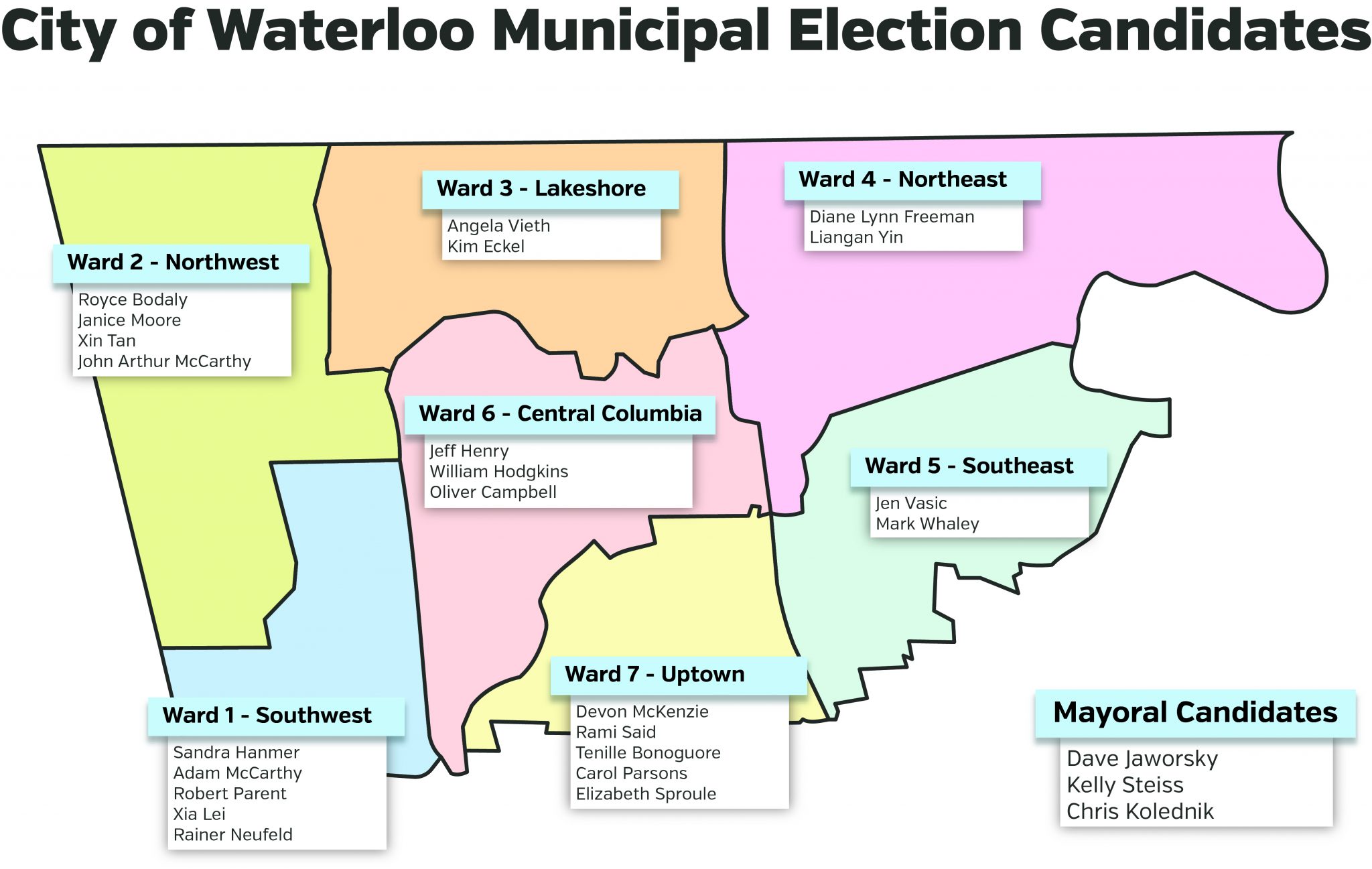An overview of the upcoming Waterloo municipal election candidates


Waterloo Region will be voting on Oct. 22, 2018, as part of the municipal council and school board elections taking place across Ontario.
We’ve spoken to our three mayoral candidates, asking about key points in their platforms and goals for their prospective terms.
Dave Jaworsky
Dave Jaworsky, our current mayor of Waterloo, is running this fall for a second term. In 2014, his three-point platform won him 55 per cent of the vote in a four-person race.
His initial interest to become involved in local politics stemmed from 25 years of business experience after graduating from the University of Waterloo. Specifically, at BlackBerry’s headquarters in Waterloo where “[his] role was to set up a corporate social responsibility team, focused on environment, community, philanthropy, university relations [and] government relations.”
Jaworsky spent a great deal of time volunteering on various local boards and committees such as the Greater KW Chamber of Commerce, KW Community Foundation, KidsAbility as well as Waterloo’s minor hockey and soccer associations.
“It occurred to me that I could do a lot more — the ultimate community job is mayor,” Jaworsky said.
When asked about achievements made during his term thus far, Jaworsky discussed Waterloo’s economic resilience regarding the growth of businesses and jobs.
“Our largest employer, Blackberry, was shedding thousands of jobs,” Jaworsky said. “We invested in Communitech to bring them to our uptown area … we made investments in the Accel-erator Centre so that they could create more companies.”
Jaworsky places emphasis on the importance of Waterloo as “Canada’s education city” and making the city more accessible to students when they’re here to study and when they graduate, as well.
“We lobbied alongside students to get a new standardized rental housing agreement eventually so that students have a better upper hand when dealing with their landlords,” he said.
Jaworsky’s official platform will be released in early September, but he discussed some of the changes being made within Waterloo with the hopes of continuation in the new term.
This includes creating more parks and implementing more segregated bike lanes with focus on streets surrounding the campuses of Laurier, University of Waterloo and Conestoga College.
Kelly Steiss
Another mayoral candidate is Kelly Steiss. After graduating from the University of Waterloo with a BA in Social Development Studies and a diploma in social work, Kelly has been working for the municipal governments of both Kitchener and Waterloo for the past 16 years.
“This was really a time where I needed to step forward and offer my experience and leadership skills,” Steiss said.
“As I’ve been meeting with businesses and talking with [residents] in Waterloo, they are not feeling that our current mayor and council are listening to them.”
“One of the things I want to accomplish in the next four years is for us to have a more transparent, accountable and accessible government,” she said.
Kelly mentions our city’s need to be more proactive about homelessness and subsidized housing in Waterloo region.
“One of the things that is really important to me is fiscal responsibility,” Steiss said.
“[It has been] presented that we have a six percent tax increase for the city of Waterloo.”
“It is important that we are open and transparent about why we need that kind of money and how we will use it.”
“It’s about creating a vibrancy in our city … I want students to want to stay, and be able to afford to stay, in our city,” she added.
Although her official platform will not be available until September, Steiss emphasizes the importance of supporting local businesses, having places of interest and attracting and retaining talent in the city, with the goals of economic growth and diversifying Waterloo’s culture.
Chris Kolednik
Our third mayoral candidate, Chris Kolednik, is a Carleton University alumnus and graduated with an honours law degree, with a concentration in policy and government.
Now working as a real estate broker, Kolednik recalls on his political intuition being sparked at an early age and has been preparing to run for mayor by keeping up with what’s going on in Waterloo as of late.
“I’ve done a bunch of door-knocking and the top three things that come up are basically property taxes, the LRT (light-rail transit) and safe injection sites,” Kolednik said.
“There’s no fiscal prudence in the city … [the] cost of living has gone up for a tremendous amount of people [and] that’s predominantly one of the reasons why I’m running.”
“Most [residences] are opposed to safe injection sites. If I do get elected that’s something we won’t ever see in Waterloo,” he added. “I believe in rehabilitation.”
Chris has been door-knocking for his campaign in mainly non-student residential areas in the region but is also trying to get more students involved in our elections this year by using social media outlets like Reddit.
“Whether you’re going to live here for six months, a year or for a three or four-year program, you’re a big part of the community,” Kolednik said.
“I’m a business guy first … at the end of the day, people want stability and security in their lives.”
Chris’s official platform will, as well, be available in September.
Councillor for Ward 7
Ward 7 refers to Waterloo’s uptown district and is the ward that represents Laurier’s campus and most adjacent student housing.
There are five candidates for councillor of Ward 7: Devon McKenzie, Rami Said, Tenille Bonoguore, Carol Parsons and Elizabeth Sproule.

